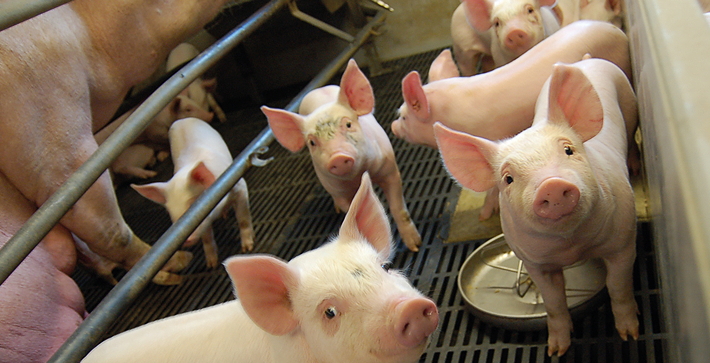NPA senior policy advisor Georgina Crayford has written to the Food Standards Agency (FSA) about the NPA’s ‘significant concerns’ over proposed new copper limits in piglet feed.
Last year, the European Food Safety Authority (EFSA) recommended a massive reduction in permitted copper levels in piglets diets, from 170mg/kg to just 25mg/kg, due to environmental concerns. This was alongside much lower proposed reductions for cattle.
EFSA said the recommended levels were considered sufficient to satisfy the nutritional needs for copper of these animal groups and were based on an ‘extensive systematic literature review and data collected from Member States and stakeholders’. The review panel estimated that the reduction of copper in feed for piglets would reduce the release of copper into the environment through manure by 20%.
The proposal is due to be discussed at a meeting of the European Commission’s Standing Committee on Plants, Animals, Food and Feed this week.
The NPA is concerned that reductions in copper coming at the same time as the industry faces the loss of zinc oxide and pressure to reduce antibiotic use will make it very difficult to control post-weaning diarrhoea in piglets.
“We need to avoid drastic reductions so that members can focus on antibiotic reduction unhindered at this critical time,” Dr Crayford said.
Improved performance
In the letter to the FSA, she noted that ‘numerous studies’ have shown that supplementation of the diet with copper (Cu) at pharmacological levels (150–250 mg/kg) improves growth performance in weaned pigs. This is why commercial diets for weaned pigs up to 12 weeks generally contain a Cu supplement close to 170 mg/kg in the EU.
Recent studies have demonstrated a loss in performance in weaned pigs during the nursery period when Cu supplementation was reduced, alongside an increased number of pigs with loose faeces and diarrhoea.
Dr Crayford wrote: “The UK pig industry is currently making great progress in reducing antibiotic use and is targeting a 60% reduction over five years to 2020.
“Reductions in permitted levels of copper in the diet of weaned pigs, coupled with a ban on zinc oxide, would result in an increased incidence of post-weaning diarrhoea, which would negatively affect piglet welfare and hamper the ability of the pig sector to further reduce its use of antibiotics.
“Indeed, if the pig industry were to lose the beneficial effects of both zinc oxide and copper one might expect to see increased use of antibiotics, which in turn may result in development of resistant bacteria, jeopardising the health of both animals and humans.”
Environmental concerns
She said the NPA recognised the importance of minimising harm to soil ecosystems from elevated concentrations of heavy metals, including Cu. But she cited research by the UK Centre for Ecology and Hydrology that, while identifying a statistically significant increase in Cu concentrations in UK soils between 1998 and 2007, found no changes were detected in arable land where most animal manure is applied.
“This suggests that extraction of copper from the soil by cropping helps to prevent increases in concentrations of this metal from application of animal manure,” Dr Crayford wrote.
“It is for these reasons that NPA strongly opposes substantial reductions in permitted copper levels for piglet feed.
“Minimal reductions may be acceptable, but maximum limits set below that which we expect the European Commission to propose this week (150 ppm during 4 weeks after weaning and 100 ppm from week 5 to week 8 post-weaning) would be unworkable.
“We urge the Food Standards Agency to support our view and highlight these concerns to the European Commission.”




